

The Frontman of Empire: How Bono’s “Activism” Serves the Powerful
by Alan MacLeod | June 6, 2022
Bono is again in the news for his political activism. At the behest of Ukraine’s President Volodymyr Zelensky, the Irish rockstar and frontman of U2 traveled to Kiev, where he performed a few songs with Ukrainian soldiers inside the Khreshchatyk metro station to a crowd of around 100 people – most of whom were journalists. After the concert was over, Bono addressed the Ukrainian people through the media, stating, “Your president leads the world in the cause of freedom right now; …the people of Ukraine are not just fighting for your own freedom, you’re fighting for all of us who love freedom,” while also calling for regime change in Russia.
#UKRAINE: @U2 Bono performed inside the metro in #Kyiv today. ? pic.twitter.com/ma8pJm0c1V
— Igor Sushko (@igorsushko) May 8, 2022
Earlier, Bono sent U.S. House Speaker Nancy Pelosi the following poem, in which he anointed Zelensky a living saint. Pelosi read it out at an event celebrating St. Patrick’s Day:
Oh, St Patrick he drove out the snakes
With his prayers but that’s not all it takes
For the snake symbolizes
An evil that rises
And hides in your heart, as it breaks
And the evil has risen my friends
From the darkness that lives in some men
But in sorrow and fear
That’s when saints can appear
To drive out those old snakes once again
And they struggle for us to be free
From the psycho in this human family
Ireland’s sorrow and pain
Is now the Ukraine
And St Patrick’s name now Zelensky
His work was not well received, being described as “unhinged,” “a particular kind of awful,” and “literally the worst poem ever written,” in the media. His recent activism has also failed to impress Dr. Harry Browne of Technological University Dublin and author of the book “The Frontman: Bono (In the Name of Power).”
“I guess Zelensky is just old enough to remember when U2 were cool, and certainly old enough to remember [Bono] as a key public figure in global decision-making on humanitarian policy,” Dr. Browne told MintPress, adding, “My impression is that the event didn’t play all that well globally… In general it seems like Bono’s ship has perhaps sailed: he’s no longer a useful or even credible image of the West’s best intentions.”
This, however, is far from the first time the 62-year-old Dublin native has publicly chosen sides in wars. In 2016, for instance, he accepted Turkish Prime Minister Ahmet Davutoğlu’s offer to join him on a much-publicized visit to a camp for Syrian refugees near the Turkey-Syria border. Bono extolled “the Turkish people’s generosity,” adding that Turkey’s response to the Syrian Civil War was a “lesson” for the world. This message was undermined somewhat as, barely two weeks later, Turkey invaded and occupied Syria and has not left since.
Friends in High Places
Since his first major foray into activism at the 1984 Live Aid concert (where much of the money raised reportedly went to buy weapons for the Ethiopian military), Bono has become an almost ubiquitous face in the halls of power, being invited to speak at a host of elite events on poverty, including the Munich Security Conference, the G8 summit, the World Bank and at the World Economic Forum. There, he is usually treated as the voice of Africa and an intellectual and moral powerhouse helping to solve the world’s most pressing humanitarian problems.
Yet critics would say that, far from helping the poor and challenging power, he has instead bolstered it. As Browne wrote:
Bono has been, more often than not, amplifying elite discourses, advocating ineffective solutions, patronizing the poor, and kissing the arses of the rich and powerful. He has been generating and reproducing ways of seeing the developing world, especially Africa, that are no more than a slick mix of traditional missionary and commercial colonialism, in which the poor world exists as a task for the rich world to complete.”
In this line of work, Bono has gladly rubbed shoulders with many of the most notorious individuals the world has to offer. At the World Bank, he discussed poverty with Paul Wolfowitz, one of the chief architects of the Iraq War. At the World Economic Forum, he told Rwandan genocidaire Paul Kagame and International Monetary Fund chief Christine Lagarde that “capitalism has lifted more people out of poverty than any other ‘ism.’” Indeed, it is hard to find a powerful figure with whom he has not joined forces.
In 2013, he met with the Obamas in Dublin, acting as their tour guide. Four years later, he was praising Vice-President Mike Pence as a champion of humanitarianism in Africa. Other controversial figures with whom he has been sure to be seen glad-handing include French President Emmanuel Macron and U.S. war planner Henry Kissinger.
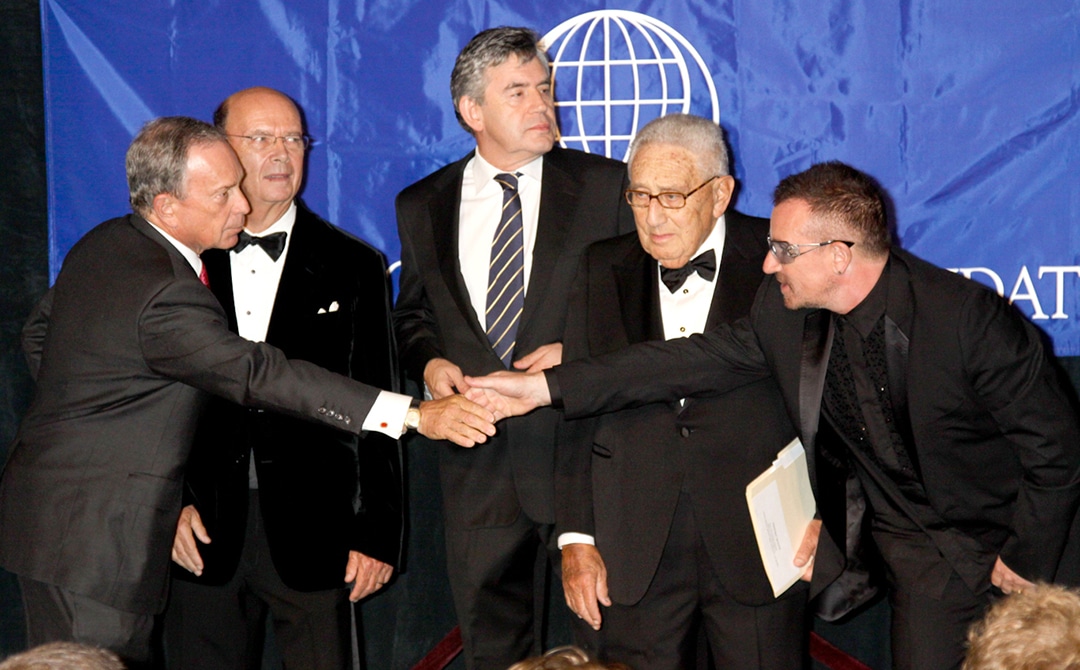
From left to right, Mike Bloomberg, Wilbur Ross , Gordon Brown, Henry Kissinger and Bono at the 2009 Appeal of Conscience Foundation Fundraiser. Photo | Alamy
While claiming to care deeply about ending poverty, the Irish singer has consistently joined forces with many of the individuals and groups most responsible for keeping the world in a state of destitution. In 2005, he wrote the introduction to Jeffrey Sachs’ book “The End of Poverty.” An extremely influential economist, Sachs, more than almost anyone, was responsible for the collapse in living standards in 1990s Russia, as it embraced an orgy of privatization and hyper-refined gangster capitalism that stripped away its formerly impressive social safety net. This led the country’s population to shrink by 6.6 million between 1992 and 2006 as millions died in the economic destruction. His advice to Bolivian dictator Hugo Banzer also resulted in a catastrophe that saw hyperinflation reach 14,000% – but also saw many of Bolivia’s wealthiest individuals increase their wealth.
Bono is also something of a disciple of Lawrence Summers, the former chief economist at the World Bank and board member of Bono’s ONE Campaign, a charitable organization that claims to be fighting extreme poverty and preventable illness in Africa. Like Sachs, Summers was one of the principal creators of the extreme inequality we see around the world today. While at the World Bank, he strong-armed countries in the Global South into privatizing their assets and allowing Western corporations to pillage their natural resources, all while drastically cutting back on social programs that kept hundreds of millions alive.
Publicly, however, Summers is probably best known for the infamous Summers Memo, a letter that he wrote while heading the World Bank that argued that Western countries must be allowed to ditch their toxic waste on “underpopulated countries in Africa.” “I think the economic logic behind dumping a load of toxic waste in the lowest wage country is impeccable,” he wrote, declaring it “lamentable” that places like Los Angeles could not dump their traffic pollution on Africa as well.
Far from making him an outcast in celebrity philanthropy circles, Summers’ position on the board of the ONE Campaign serves as a vehicle through which much of Bono’s activism is channeled.
Headquartered on Pennsylvania Avenue just two blocks from the White House, the ONE Campaign is an NGO juggernaut, receiving funding from many of the largest corporations in the world, including Bank of America, Coca-Cola, Johnson & Johnson and Google. It also works closely with other elite organizations like the Bill and Melinda Gates Foundation and the Open Society Foundations. Although its stated goals of reducing poverty and illness are laudable, it remains unclear how much it has contributed to this. After all, if we remove China from the statistics, global poverty reduction is going in the wrong direction. And while it claims to be a “grassroots advocacy and campaigning organization,” one glance at the company’s board of directors suggests a different story.
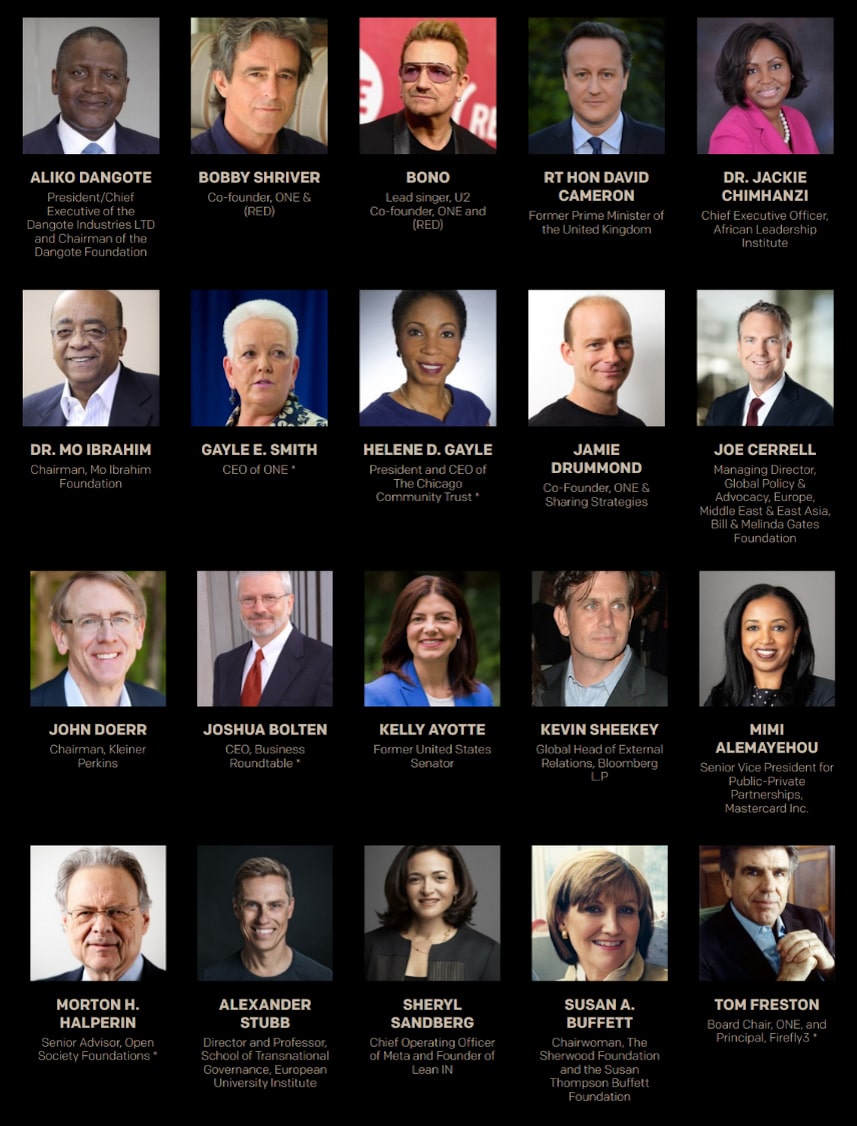
From Facebook to the US government, the ONE Campaign’s Board of Directors represents the world’s most powerful interests. Source | ONE Campaign
The ONE Campaign is headed by Gayle Smith, the former head of USAID, a U.S. governmental regime-change organization that funds political and social groups across the world that align with U.S. interests. For example, USAID was instrumental in the attempt to topple the Cuban government last year, quietly funding, training and supporting the anti-Communist activists who led a failed color revolution. Also on the ONE Campaign’s board of directors are former British Prime Minister David Cameron, the COO of Facebook, and a host of senior officials from the Bill and Melinda Gates Foundation and the Open Society Foundations.
The ONE Foundation strongly supported the New Alliance for Food Security and Nutrition, a Western-backed initiative whereby G8 countries agreed to give African states economic relief in exchange for opening up their nations to foreign agribusiness, allowing massive land grabs, and signing deals with agribusiness giants like Monsanto that will entrap them into permanent dependence on their GMO products.
As Browne noted, Bono’s style of activism, “is by definition a limited tactic to seek help in addressing the world’s problems from the people and institutions that fundamentally cause those problems to begin with, on the basis of their goodwill rather than on the basis of seizing their power.” Thus, his work ends up whitewashing the very institutions enslaving the world. Bono, in effect, has, therefore, become the frontman of empire. Powerful organizations that hold African nations down are not challenged by this form of activism, but bolstered by it. As Browne explained:
It’s more interesting to think about it dialectically: how are those institutions served by this ‘activism’? It’s not hard, e.g., to imagine MEPs getting a lot of feel-good from t-shirted young ONE activists ‘taking over’ the European Parliament, and that in itself constitutes a purpose of the activity.”
Embracing War Criminals, Rejecting Palestinians
U2 built their entire brand around being an indie anti-war band with a social conscience. Indeed, they released an entire album called “War” to critical acclaim. The large majority of Bono’s countrymen and women opposed the Iraq war. This was likely doubly true of his fan base. Yet by 2003, Bono had so deeply integrated himself into the corridors of power and was so intimately involved with the Bush and Blair administrations that the Iraq War posed a serious quandary: do you sacrifice your credibility or your connections? In the end, he found a deeply unsatisfactory third way, endorsing the leaders but stopping just short of unqualified support for their war.
“Tony Blair is not going to war for oil. Tony Blair is sincere in his convictions about Iraq. In my opinion he is sincerely wrong. We must not make a martyr of Saddam Hussein. He is good at working the cameras,” he said. This blatant falsehood framed the decision to go to war for oil as a strategic PR mistake helping a dictator, rather than a crime.
On Bush, Bono performed similar mental gymnastics. “I’m all for President Bush trying to scare the shit out of Saddam Hussein, but you have to bring along the rest of the world…I support [Bush and Blair] all the way to the point where they go to war without the United Nations behind them. That is a mistake, because that looks like the U.S. doesn’t need to explain itself,” he said, again offering limited opposition purely on the grounds that this might look bad.
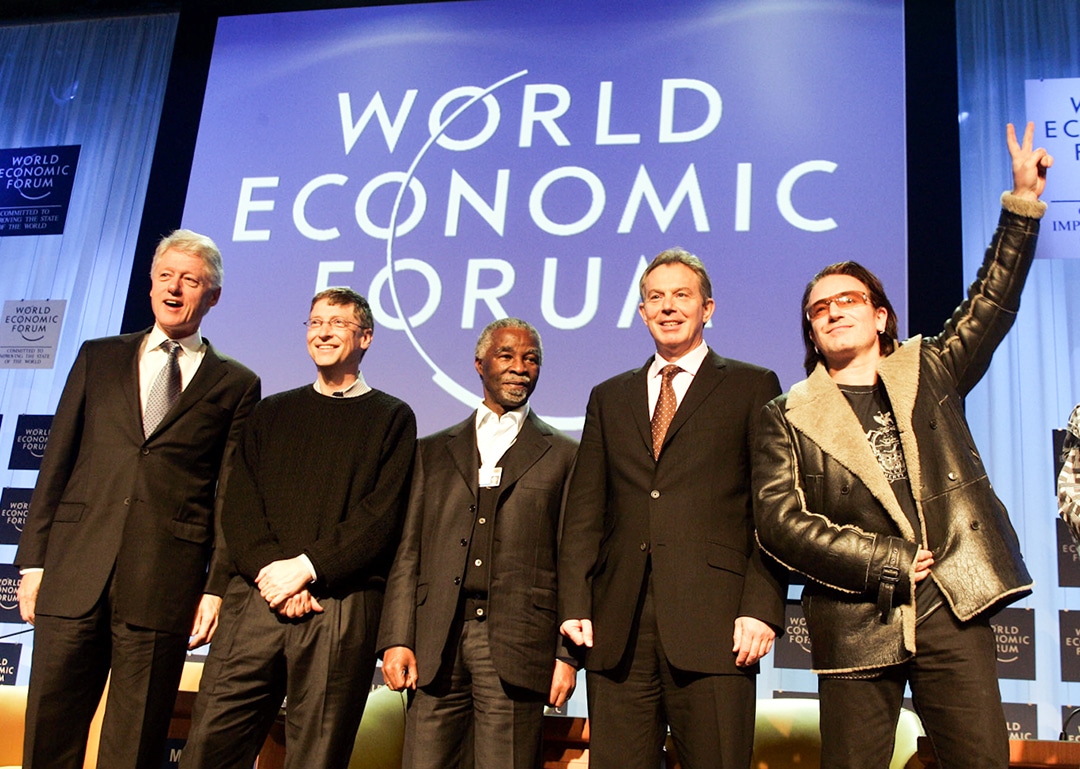
Bono, far right, poses with left to right: Bill Clinton, Bill Gates, Thabo Mbeki, and Tony Blair at the 2005 World Economic Forum in Davos. Michel Euler | AP
Any hope that Bono might take any sort of true anti-war stance was quickly dashed when the next year he personally received Blair at his home in Dublin and then spoke at the Labour Party conference, where he described the prime minister and his chancellor Gordon Brown as the “John Lennon and Paul McCartney” of global development. A close relationship blossomed. On Blair’s final day in office in 2007, Bono offered his strongest endorsement of him yet, seemingly hinting at his support for the Iraq occupation as well, stating, “What I admire most about Tony Blair is that… he has almost all of the time exposed himself to bad press and outcry for doing the things he believed in.” The Iraq War is estimated to have killed up to 2.4 million people.
Over time, the aging rocker also developed a close friendship with Bush. “I’ve become very fond of him… Underneath his armor, there’s passion, compassion. He has it,” he said. Far from criticizing Bush or America, he claimed that Africa owes them a great debt of gratitude and that there are hundreds of thousands of Africans “who owe their lives” to the American government and its generosity.
Long after Bush’s retirement, Bono still meets with the former president, visiting his Texas ranch in 2017. A year later, Bono was the inaugural recipient of the George W. Bush Medal for Distinguished Leadership, which the Irishman described as a “huge honor.” Discussing their joint work on AIDS in Africa, Bono said that he wished to “honor your leadership on the greatest health intervention in the history of medicine.” Bush responded that he was impressed with Bono’s knowledge. “The first time I met you, you knew more statistics, like you were coming right out of the CIA,” Bush said.
This hearty and unnecessary endorsement of the two architects of the Iraq War did not go down well in indie music scenes. It also caused consternation inside U2 itself. Larry Mullen, the band’s drummer, has constantly refused to be part of these stunts, stating that Bono’s friendship with “war criminals” like Bush and Blair makes him “cringe.”
Like Iraq, another excellent litmus test of the credibility of any person or group presenting themselves as a moral authority is their position on Palestine. Ireland has traditionally been a hotbed of support for Palestine, with the large majority of the country seeing parallels between the Israeli attempts to colonize and repopulate the land with Jewish settlers and the British occupation of Northern Ireland and its support of a pro-London Protestant faction. Successive Irish presidents have voiced their unwavering solidarity with the Palestinian people and their cause.
Yet U2 has gone against the grain and is one of the few Irish bands of any note to break BDS and play gigs in Israel. Bono himself is a disciple of Israeli president Shimon Peres, describing himself as his “admirer.” At a gig in Toronto, he dedicated a song to him, addressing him directly and stating, “We understand, President Peres, that you have tried to be the voice of reason. And you’ve dedicated a lot of your life… to try and bring peace in this really dangerous region.” This assessment might be news to the families of the people Peres ordered killed in multiple massacres he oversaw. Bono also attended Peres’ 90th birthday celebrations.
Yet while Bono love bombs Israeli war criminals, he rejects Palestinians as people “filled with rage and despair.” In a New York Times op-ed, he insisted that they must “find among them their Gandhi, their [Martin Luter] King, their Aung San Suu Kyi.” Thus, like others, he intentionally ignores decades of non-violent Palestinian struggle, instead maintaining they rise to the standard of fairytale versions of individuals who were not nearly as anti-violence as Western whitewashers wish they were.
In the same op-ed, Bono presented Barack Obama as a modern day Martin Luther King, despite the fact that the Obama administration continued Bush’s wars and would go on to bomb seven countries simultaneously. He also called for regime change in Iran, North Korea and Myanmar, saluting those protestors as brave heroes “who continue to take to the streets despite the certainty of brutal repression.” He would get his wish in Myanmar, where Aung San Suu Kyi would come to power and preside over a genocide of tens of thousands of Rohingya Muslims.
Tax Dodging Business Empire
In an attempt to foster a vibrant arts scene, Ireland has extremely generous tax laws for those working in the creative industries, with no artists or musicians in the country paying any income tax whatsoever on royalties below $250,000 per year. Yet U2 still decided in 2006 to move their money offshore into tax havens. The fact that an individual who styles himself the champion of the global poor was avoiding paying taxes on his reported $700 million fortune led to widespread protests. U2’s performance at the Glastonbury Festival in England in 2011 was upstaged by huge banners in the crowd highlighting the absurdity of tax-avoiding charlatans lecturing the poor on global justice. Commenting on the affair, Bono said that “smart people” should be “sensible” about the way they are taxed. U2’s lead guitarist David Evans (who insists upon being called “The Edge”) claimed that it was “ridiculous” that people were making a “big deal” about it. Bono himself would later be named in the Paradise Papers – a leak of documents hinting at the level of tax avoidance from the world’s super-wealthy elite.
Ireland’s economy fell into terminal decline after the 2008 financial crisis. Its fictitious finance bubble burst, causing untold harm to millions. The ultra-low tax regime encouraged corporations around the world to relocate to Dublin, driving up property values and gentrification to absurd levels and stealing a future from the Millennial and Zoomer generations. Yet in 2014, Bono caused outrage by insisting that the unsustainable, hyper-capitalist program successive governments pursued “brought Ireland the only prosperity we’ve ever known.” Many might ask “prosperity for whom?” “U2 are arch capitalists; they don’t seem like it but they are,” said the band’s promoter Jim Aiken.
This “do as I say, not as I do” preaching is a key reason Bono is one of the most disliked men in his home country. U2 is one of Ireland’s most recognizable exports, yet years of hypocritical, faux activism have soured many of Bono’s countryfolk against him. Browne writes that a common story among Dubliners is to tell their friends, “I saw Bono in town today, but I pretended not to recognize him – I wouldn’t give him the satisfaction.” Adding to this pretentious air is Bono’s insistence on wearing sunglasses at all times, even indoors. He has stated that he has a medical condition that necessitates it. This may well be the case. However, it is remarkable how this condition appears to afflict celebrities far more than the general population.
Bono has built up a considerable business empire, including the purchase of a large Dublin hotel and a shopping center in Lithuania owned through a shell company based in ultra-low-tax Malta. The center reportedly has paid no tax in Lithuania despite making a profit. He also founded a private equity firm in 2004 that invests in creative industries. Through this firm, he produced “Mercenaries 2,” a video game in which the object is to invade Venezuela and overthrow a “power hungry tyrant” who has seized control of the country and its oil supply. The game, which featured blatant pro-U.S. propaganda, was clearly depicting a coup against President Hugo Chavez – something which Bono’s friend Bush attempted multiple times. USAID provided the funding and the training to the failed coup plotters.
Therefore, from Iraq to Palestine to Iran and Venezuela, Bono has always stood shoulder to shoulder with the world’s powerful, attacking their enemies and shielding them from criticism. It is one thing to ruthlessly murder and starve millions; many in Washington and London do that. It is quite something else to cheerlead this process while singing your own praises and presenting yourself as a modern day saint. And it is perhaps precisely this Messiah Complex that has irked so many and made him such a controversial individual.
Bono presents himself as a radical activist ruffling feathers and standing up for the world’s oppressed. In reality, he has not done or said anything in decades that discomforts the political and economical rulers of the world, which is precisely why he is constantly invited into the halls of power. Bono is not a threat to empire; he is its smiling, singing face. Thus, if Bono is speaking truth to power, he is so close to it that he could whisper. And power likes what it hears from him. As Browne said:
Does Bono’s work serve the purposes of some of those who seek financial and ideological domination over the poor world and the rich world alike, and whose interests differ profoundly from those of the majority of us? He may not know the answer himself, but we had better.”


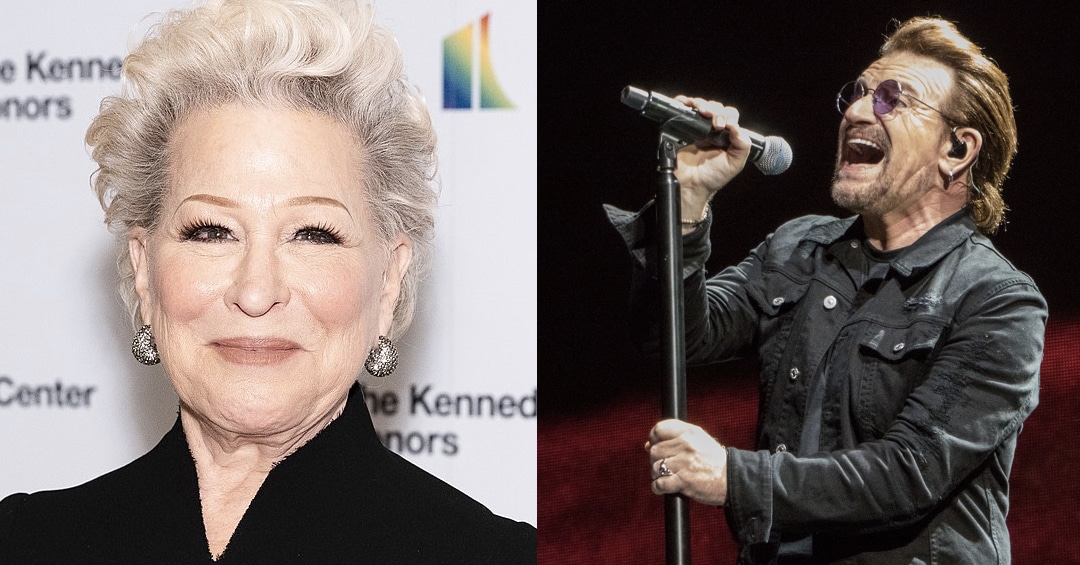
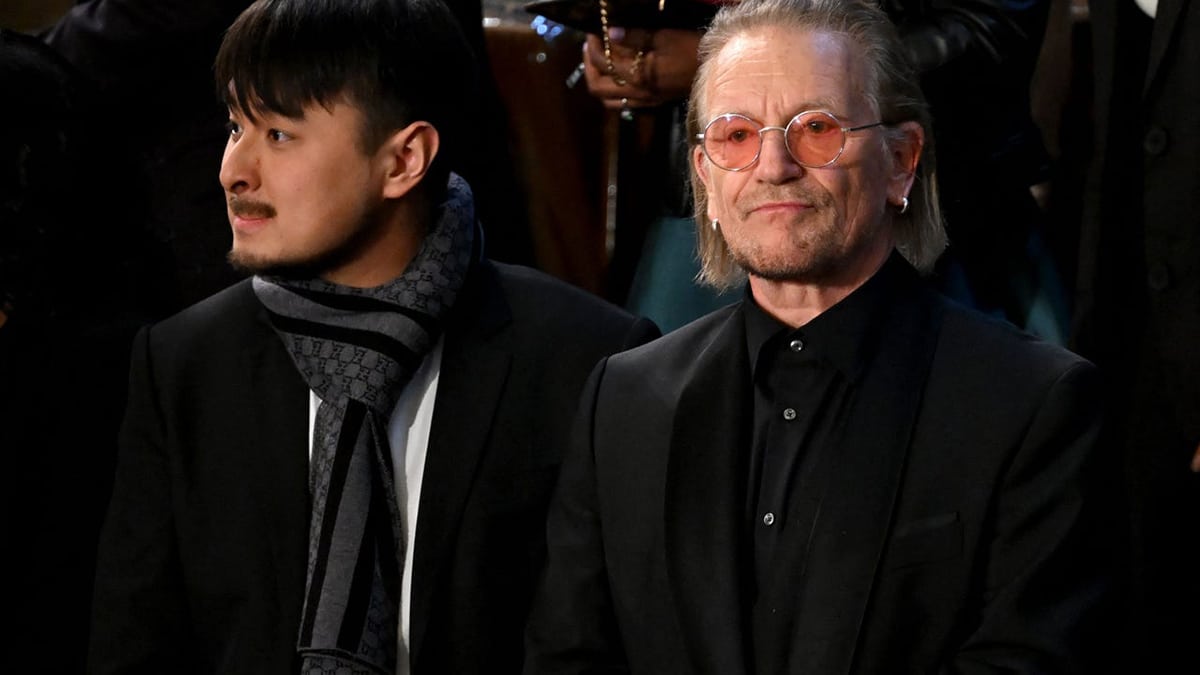
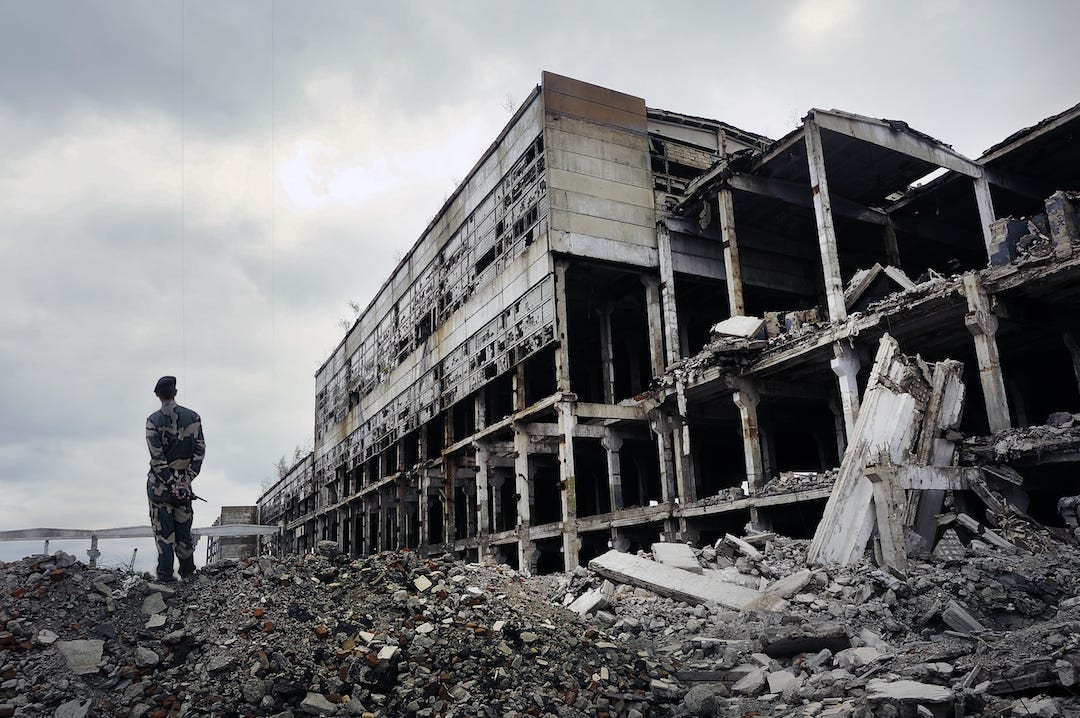
0 Comments